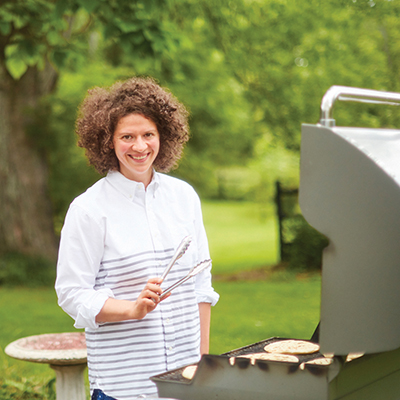
In some ways, dining and catering have never been so kaleidoscopic. Foods such as ramen, pupusas, and Hawaiian poke — once considered nichey — have gone mainstream. However, the faces and voices of those who write, film, and speak about that food can tend to be monochrome, according to author Julia Turshen.
When Turshen was working on her last cookbook, Feed The Resistance: Recipes + Ideas for Getting Involved, which was published last year, she came into a contact with a swath of accomplished women of color in the culinary sphere, and tapped some of their recipes and stories for the book. It struck her — wasn’t there a directory for this diverse pool of talent? “My initial thought was, ‘Surely this exists, I just don’t know about it,’” said Turshen, who lives in New York’s Hudson Valley and is gay. “Then I was looking around, and I couldn’t find a database like this in the food world that really lifted up new voices. When it comes to finding someone for a story or even a conference or something like that, we continually hear editors and others say, ‘We can’t find anyone.’”
Turshen wasted little time in filling the gap. This past November, she formed an advisory board to help shape her idea — a simple and searchable website listing women of different racial backgrounds and gender identities in the culinary world, from writers to chefs to professors to sommeliers. Soon after, she hired a web developer and began to contact colleagues in the food world to populate the directory, which she called Equity at the Table, or EATT for short. “It was not difficult to find that many people, by any means,” Turshen said.
Besides tapping her own contacts from her work as a food journalist, she also raided social media. In the meantime, her book was feted as Eater.com’s “Cookbook of the Year.”
Going Viral
By early April, Turshen had found 100 diverse and fresh voices for EATT, professionals in recipe development, catering, video production, nutrition, law — practically any angle that one can think of in the food world. Joining EATT was straightforward: List relevant details, including locale, upload a picture, and provide links to work or social-media channels. “The whole point of Equity at the Table is inclusivity at every turn,” Turshen said, as well as ease for users — both those who upload their information and those who access it.
EATT launched on April 4, and almost immediately went viral in food and mainstream media. Stories about EATT, and interviews with Turshen popped up in The New York Times, Food & Wine magazine, and elsewhere. About a week after the launch, the site had swelled to 300 people, and its ranks were rapidly growing. Turshen said one of her earliest gratifying moments was when a founding member, a lawyer named Jasmine Moy, tweeted that she had been queried the same day the site went live. “Wow,” she wrote, “that was fast.”
“What sets EATT apart is that we’re working with people who do so many different things,” Turshen said. “It’s not like a single profession. It’s reflective of the whole food industry, which is such a gigantic umbrella term. Within the food industry, there are so many other industries. There is the restaurant industry, there are cookbooks, nonprofits, there’s farming.”
It was clear EATT was shining the spotlight on people who had been contributing to the food world but flying under the radar. Joshna Maharaj, a Toronto-based chef, activist, and speaker, whose work focuses on food systems for institutions and organizations, said that joining EATT was a nobrainer. “I’ve sometimes been the only brown woman in these circles, and I’ve gotten quite happy and used to it,” said Maharaj, who spoke at TedxToronto this year. “It’s been an interesting transition for me to realize that I’m part of a larger community and other really smart, really accomplished brown girls. I had gotten used to being the only one. What I think is exciting is to no longer have to be shoehorned into the ‘other’ category.”
Writer, speaker, and radio producer Von Diaz, whom Turshen met and featured while working on Feed The Resistance, was one of the first to sign up, too. Diaz, whose writing and video work focuses on Puerto Rican food — and who spoke at TedxPiscataquaRiver in 2015 — said that the underrepresentation she’s witnessed in the food-writing world can extend to conferences.
“Oftentimes, folks of color are not given the opportunity to rise to a level where they might be noticed or speak on a panel,” she said. “Fairly consistently, there is lack of representation from folks of color across all of these panels. Even at my TEDx Talk, I was among two or three folks of color.”
Diaz said sites such as EATT make it that much harder for editors, producers, and conference organizers to default to the rationale that there is a lack of diverse talent. “It counters that. When you say you can’t find a writer of color to do a story on fried chicken, here are 100 writers of color who can,” Diaz said. “It’s also about having this collection, this community of people who can be a resource to make it more equitable in terms of how they source stories or hire a caterer.”
To access the listings at Equity At The Table, visit equityatthetable.com.
Ascent is supported by Visit Seattle and the PCMA Education Foundation.




